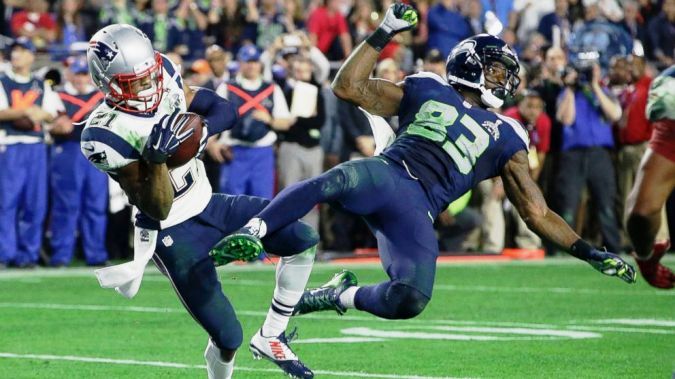
Ever since Sunday’s incredible and unpredictable end to this year’s Super Bowl, talk has been circulating across the media.
Let’s go to NFL.com columnist Mike Silver: “Seattle was 1 yard away from securing a second consecutive championship — but instead of handing the rock to Marshawn Lynch, the most powerful goal-line runner in football, [Seattle Coach Pete] Carroll called a pass play, causing double-takes on his sideline and in living rooms and sports bars all over the football-watching world.
“And when Russell Wilson’s goal-line slant to Ricardo Lockette was jumped and intercepted by [Patriot’s] rookie Malcolm Butler, Carroll earned himself a lifetime’s worth of second-guessing from aghast witnesses…”
Pete Carroll did not waste any time responding. “ ‘That’s my fault, totally,’ Carroll said on NBC’s postgame show. ‘… we were playing for third and fourth down, give them no time left … but didn’t work out that way.’ ”
But this commentary is not about Carroll’s mistake. It’s about another, crazier decision made by a small group of well-educated, deluded parents whose personal decision continues to affect others.

On the same Monday (Feb. 2) that everyone was talking about the Super Bowl, FOX News anchor Megyn Kelly went on The O’Reilly Factor to talk about the recent outbreak of measles originating from California’s Disneyland where, apparently, one or more measles-infected kids who had not been vaccinated had spread the highly infectious disease.
What follows is a report from Politifact, the fact-checking organization, which lists seven different sources and eight papers on the legitimacy of the measles vaccination. I’m including the entire article not only for context, but so that no one will even think I’ve pulled any clever editing to put forth a biased view on this issue.
“As the number of cases of measles slowly grows across the United States, it has revived a past debate over the safety of the vaccine that for decades prevented an outbreak. Potential presidential contenders, including Sen. Rand Paul, R-Ky., and New Jersey Gov. Chris Christie, have suggested that parents should be allowed to decline vaccination for their children if they have concerns over side effects.
“Two Fox News hosts, Bill O’Reilly and Megyn Kelly, tackled the touchy topic of mandatory vaccinations on The O’Reilly Factor on Feb. 2, 2015.
“Kelly said she had all three of her children vaccinated and that for immunization programs to work, they must be mandatory. Kelly, however, cut some slack for parents who might have decided otherwise a few years ago.
“ ‘They were given bad information years ago by a U.K. study that came out in 1998,’ Kelly said. ‘Five years ago the science wasn’t even as certain as it is today. It is very certain today.’
“In this fact-check, we take a look at the scientific certainty over the safety of vaccination. Along the way, we’ll see if the science has become even more certain in the past five years.
“We told Fox News we were digging into this and didn’t hear back, but Kelly’s five-year mark lines up with the formal retraction of that United Kingdom study she mentioned. To quickly recap, in 1998, a British medical journal called the Lancet published a paper by Andrew Wakefield and a dozen colleagues that claimed to show a link between the MMR (measles, mumps, rubella) vaccine and autism. Many parents responded with predictable fear and vaccination rates began falling. The impact was strongest in the United Kingdom where the rate fell from the 90 percent range down to 80 percent. The United States saw a minor dip. In some states, the rate dropped below 90 percent although nationally the rate remained higher.
“In 2010, roughly five years ago, the Lancet retracted Wakefield’s study. This seems to be the benchmark for Kelly’s comparison. What we heard from the public health community is that not only is the medical science clear today, it was back in 2010 as well.
The scientists were sure
“Dr. Mark Schleiss is director of Pediatric Infectious Diseases at the University of Minnesota Medical School. Schleiss told PunditFact that the science was clear in 2010, and it’s clear today.
“ ‘Wakefield’s work had been discredited within a year or two of publication,’ Schleiss said. ‘After Wakefield, there were a number of other studies performed, and it was convincingly shown that there was no link with autism, but that safety information was already known well before that.’
“Schleiss dates efforts to test the safety of childhood immunizations back to the 1980s when there were reports that the whooping cough vaccine caused developmental disorders. The Centers for Disease Control and Prevention and the Institute of Medicine (at the time, a division of the National Academy of Sciences) conducted studies and found the whooping cough reports without merit. Along the way, that work also established the safety of the MMR vaccine and would undermine Wakefield’s research in the Lancet.
“The Wakefield study had such a high profile that it spurred further rounds of research. In 2001, the Institute of Medicine published a report that found no evidence of an association between the vaccine and autism. In 2004, the institute conducted another review.
“The institute said in a press release, ‘14 large epidemiological studies consistently showed no association between the MMR vaccine and autism.’
“Dr. Marie McCormick, a professor at the Harvard School of Public Health, oversaw the committee that conducted the 2004 IOM vaccine safety review. McCormick told us that there were no divisions within the scientific community at that time.
“ ‘I think that the data were pretty firm as of 2004,’ McCormick said.
“By 2004, 10 of Wakefield’s co-authors had withdrawn their names from his study. Other things also had happened. Brian Deer, a British journalist, documented shoddy data that underlay the results. Deer also found that Wakefield never disclosed that he had been paid by a lawyer representing some of the children cited in the article. In the British Medical Journal, Deer later exposed how Wakefield engaged in an elaborate scientific fraud.
“Wakefield sued the British Medical Journal and lost. Editor-in-chief Fiona Godlee told PunditFact that ‘the science has been much the same throughout the MMR scare caused by Wakefield’s paper.’
“McCormick said the one thing that did change over the years was the public reporting around the topic. At the height of the scare, McCormick said news coverage suffered from a systematic flaw.
“ ‘If a reporter interviewed a scientist about the results, she would almost automatically give equal time and weight to an opponent of vaccines regardless of the validity of their opinion,’ McCormick said. ‘Thus, to the viewer or reader, the issue would seem evenly balanced, even when it was not.’
Our ruling
“Kelly said that the science on vaccine safety is certain today.
“The researchers we contacted said that as far as the science is concerned, certainty had been reached at least 10 years ago with the release of a major national study debunking the link between the measles mumps, rubella vaccine and autism. Five years ago, the British journal the Lancet retracted the original report that triggered the initial wave of fear.
“That decision was the final nail in the coffin of a discredited report. If anything, Kelly undersold her point about when scientists agreed that vaccination is safe.
“We rate the claim True.”
Measles is a preventable disease, and yet, there are parents who, based on their own confirmation bias, choose to ignore the facts of science and, not only put their own children at risk, but potentially, many others.
New York Times columnist Frank Bruni points out (Jan. 31), “In 2004, there were just 37 reported cases of measles in the United States. In 2014, there were 644. And while none of those patients died, measles can kill. Before vaccines for it became widespread in 1963, millions of Americans were infected annually, and 400 to 500 died each year.
“ ‘I don’t think its fatality rate has decreased,’ said Daniel Salmon, a vaccine expert at the Johns Hopkins Bloomberg School of Public Health. ‘We just haven’t had enough cases for someone to die.’
“I’m not entirely baffled by the fear of vaccines,” Bruni writes, “which arises in part from a mistrust of drug companies and a medical establishment that have made past mistakes. But this subject has been studied and studied and studied, and it’s abundantly clear that we’re best served by vaccinating all of those children who can be, so that the ones who can’t be — for medical reasons such as a compromised immune system — are protected.”
Washington Post columnist Kathleen Parker is more succinct: “Is there a vaccine for ignorance?”
After last Sunday’s game, Seattle Coach Carroll said that he learned “A very, very hard lesson. I hate to learn the hard way, but there’s no other way to look at it right now.”
Carroll’s talking about a mistake in strategy for a game.
While I believe in individual rights, parents should not continue to make the same mistake when making decisions about the health of their children and others who would be put at risk.
Comments









